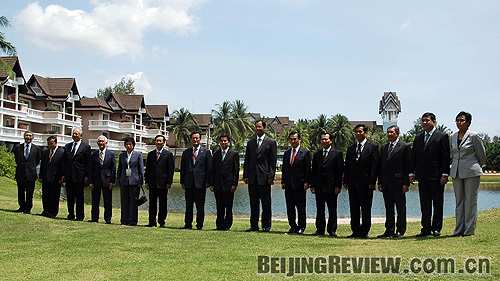| As the global financial crisis continues to spread worldwide, its impact on the member states of the Association of Southeast Asian Nations (ASEAN) and the ASEAN Plus Three countries-China, Japan and South Korea-is deepening, according to a semi-annual report recently released by the East Asian Economic News of the World Bank.
 |
|
PHOTO OP: The ASEAN Plus China, Japan and South Korea finance ministers meeting is held in Phuket, Thailand, on February 22. Finance ministers agreed to expand the scale of a regional foreign exchange reserve pool from $80 billion to $120 billion (SHEN MIN) | Faced with slumping exports and other challenges, Asian countries have come up with huge bailout packages in an effort to minimize the economic damage.
China announced a 4-trillion-yuan ($586-billion) stimulus plan in November last year to expand its economy, helping sustain global economic growth.
Meanwhile, Japan unveiled an economic stimulus package worth about 26.9 trillion yen ($277 billion) in late October 2008. On April 6 Japanese Finance Minister Kaoru Yosano called for a second supplementary budget worth 2 percent of gross domestic product (GDP)-about 10 trillion yen ($100 billion)-to further stimulate the economy.
The Indonesian Government plans to inject 73.3 trillion rupiah ($8 billion) in 2009. In response to the economic slowdown, the Singaporean Government released an economic stimulus package worth 2.3 billion Singapore dollars ($1.53 billion) on November 21 last year, not long after the Malaysian Government announced $2 billion in stimulus spending. Malaysia approved another $2.7-billion package in early March this year, and the Vietnamese Government tabled a $1-billion stimulus plan in early February.
While vying to bring forth their economic stimulus packages, the governments of Asian nations have come to recognize the value of cooperation and joint efforts in mitigating the effects of the financial crisis.
At an ASEAN Plus Three finance ministers' meeting in Phuket, Thailand on February 22, members proposed an action plan based on increased trade and investment liberalization to restore the regional economy and financial stability. Finance ministers from the participating countries also agreed at the meeting to expand the scale of a regional foreign exchange reserve pool from $80 billion to $120 billion. With regard to the $120-billion regional reserve pool, the 10 ASEAN member states insisted that they provide 20 percent of funding and Japan, China and South Korea provide the other 80 percent.
The 14th ASEAN summit was held from February 26 to March 1 in the scenic resort town of Hua Hin in south Thailand. Officials at the summit agreed to adopt resolute and effective policies and restore confidence in the market and finance sectors so as to spur regional economic growth.
Meanwhile, they voiced opposition to trade protectionism and support for the Doha Round talks. This represents an important step forward taken by ASEAN member countries through their coordinated moves to cope with the crisis after the ASEAN Charter came into force on December 15, 2008.
The Chinese Government has formulated its plan to meet its goal of about 8- percent economic growth in 2009 in a bid to reinforce "China's confidence" in the recovery of the Asian economy as a whole. China's contribution to global economic growth reached 22 percent in 2008 and could be as high as 50 percent this year, according to the 2009 World Economic Outlook by the International Monetary Fund.
"China's huge stimulus plan will also contribute to the world economy," Jose Angel Gurria Treviño, Secretary General of the Paris-based Organization for Economic Cooperation and Development (OECD), said during a press conference on March 29. "China's steady and healthy economic development will help the economies of other regions to develop as well. It will provide opportunities for foreign investors and enterprises."
Even if the world economic slowdown worsens, as is widely expected, China still has "a lot of options keeping the world economy healthy," he added.
China and ASEAN have developed closer cooperative ties, along with active cultural exchanges and progress in bilateral security cooperation, since establishing Sino-ASEAN dialogue relations in 1991. Under the principle of "making good friends with neighbors and maintaining harmony with them," China seeks regional peace through cooperation, deepening mutual trust and win-win results.
Moreover, it is against the backdrop of the world financial crisis that China has signed currency swap agreements with South Korea, Malaysia, Indonesia and other countries in the region, so as to prop up regional trade.
The author is a People's Daily reporter and this story was first published in People's Daily Online | 